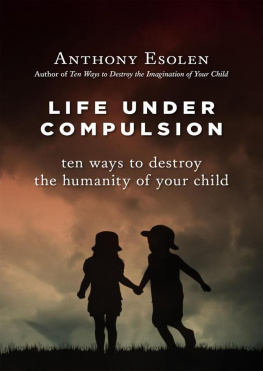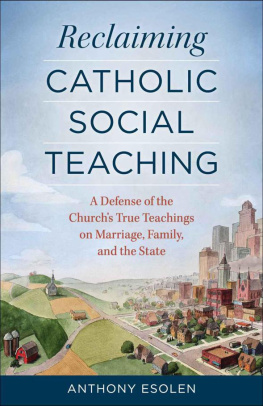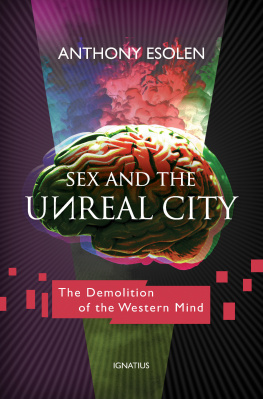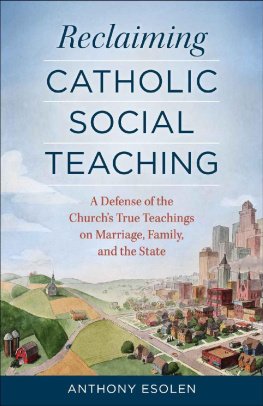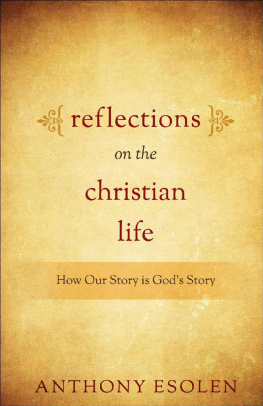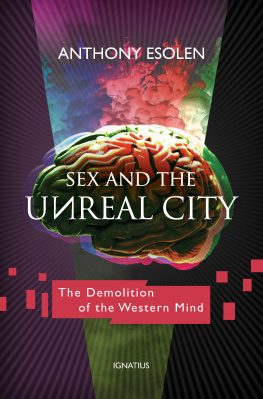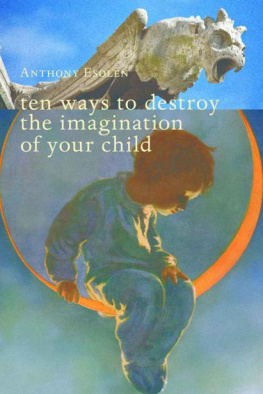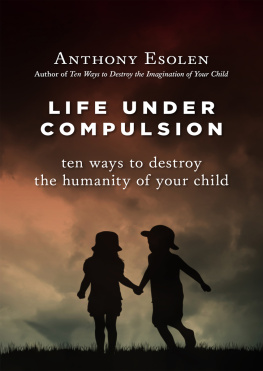Life Under Compulsion
Ten Ways to Destroy the Humanity of Your Child
Anthony Esolen

Wilmington, Delaware
For my wife, Debra,
the maker and the keeper of our home
Contents
Introduction
Life Under Compulsion
The trouble with language is that you can use it not only to reveal the truth but also to conceal it or distort it. We are taken in by words. In the Garden of Eden the serpent said to Eve, Ye shall be as gods, and Eve was too eager to pause to examine the meaning of the word gods, or why Satan used the plural rather than the singular. Most of the harm that we suffer by misused language comes not from conscious liars, like the serpent, but from ourselves, from an unconscious and persistent tendency to reverse the order of reality and language. Words take the place of things. We hear the word education and think immediately of our state-ordered system of schools, where little that merits the name of education may be going on. We hear the word equality and immediately think of the justice of the civil rights movement, and we do not pause to ask what is equal to what, or even whether the things we are equating are commensurable.
I believe that the same automatism has taken over the word freedom, which now means for most of us a mere permission slip guaranteed by the state. I am writing this book because I believe we are bringing our children up not for the freedom we enjoy but for the compulsions we suffer. Some of those compulsions we even mistake for freedom, so that the more of them we win, the more tightly we bind ourselves, body and soul.
What do I mean by the word compulsion? Lets consider a few situations in which the auxiliary verb must comes into play:
Pa has been surprised by a blizzard on his way walking from town to his homestead on the prairie. He cannot see more than a foot in front of him. He has no way of telling whether he is walking toward home or away from it or in circles. Eventually he falls through a snow crust into a hollow where the air is good. The snow is heaped up around and above him, a good eight or nine feet high. He knows that he must stay there to wait out the blizzard, though that may take days. He tries very hard not to eat the oyster crackers that he was bringing back as a Christmas treat, but after a day or two he can no longer hold out. His body commands him. He must have something to eat.
An uncle is writing to his nephew, giving him advice on how to lead his patient to damnation. He recommends bringing the patient into company with friends who are worldly and flippant, whose conversation is predictable in its sophistry, who are conformists of nonconformity, and who never think of God without the automatic irony of feeling superior to the lowly people who believe in Him. The nephew should lead the patient into the habits of these friends, and as habit, he says, renders the pleasures of vanity and excitement and flippancy at once less pleasant and harder to forgo you will find that anything or nothing is sufficient to attract his wandering attention. You can make him waste his time not only in conversation he enjoys with people whom he likes, but in conversations with those he cares nothing about on subjects that bore him. The patient will do these things because he must, though he may never actually hear a command telling him so.
A man has made his name feared by all the people in the country around him. He dwells on a mountain in an impregnable fortress, manned by his ruffians and villains. He sometimes does things that redound to justice, from the sheer pleasure of exercising his power; more often, though, he exercises his power on behalf of evil intentions, atrocious revenges, or tyrannical caprice. He has taken delight to do whatever the laws forbade, and now, after many years, it has become automatic in him. He has promised a subordinate baron to kidnap a pious girl from a convent, where she is in hiding. The baron wants to ravish her. The warlords ruffians do kidnap the girl, but they are moved by her weeping and her promise to pray for them. The warlord begins to feel uneasy. I must be rid of her, he says to himself, when all at once another voice from within him replied with a resounding No! He must not give the girl to the baron.
The pilgrim Dante is with his guide Beatrice in Paradise. They are standing before the souls of the wise, who appear to them as stars of surpassing light. Someone must reveal to Dante who they are. One of the twelve souls thus comes forward and, knowing how ardently Dante longs to know their names, and how bountifully the grace of God has been poured upon him, says this:
He whod deny his flask of wine to slake
your thirst would not be free, would have such power
as rivers not returning to the sea.
He simply must answer love with love. If he did not comply with that must, he would not be acting as a free soul. The saint who speaks is Thomas Aquinas.
Let us look at the four cases. The first, from Laura Ingalls Wilders autobiographical Little House on the Prairie, describes a hardy and virtuous man in a dangerous situation. He is motivated at all moments by a perfectly reasonable and just desire to preserve himself from death, and by his love for his family. His body cries out for food. What he does in eating the oyster crackers is trivial enough, and because it was so trivial, he could not hold out. Had it been instead the difference between life and death for his family, he would never have eaten the crackers. His body overrules himbut his reason allows it. It is also an unusual circumstance. We do not often find ourselves in snow caves in the midst of a blizzard. This is not what I am calling compulsion.
The fourth case, that of Dante before the blessed souls, might look like compulsion to the modern reader, and that is why I include it here. Thomas Aquinas expresses the paradox quite well. To be free is not to do as you please but rather to realize the fulfillment of your natural and created being, without impediments. To admit those impediments would be to compromise your freedom. It would be like cutting your own hamstrings. So when love is offered, the free heart, unimpeded by niggling selfishness, responds in love. When truth is asked for, the free mind, seeing truth clearly and not wishing to duck under a covert, speaks the truth. To will to do otherwise would be like willing that you were not the kind of being you are. You would then be a self-contradiction. The river flows naturally to the sea; its nature impels it to do so. Mans nature impels him to love what is beautiful and to seek the truth. That drive for love and truth is itself his liberty. This drive is natural and good. The river should not be blocked up with mud. Thomas Aquinas must greet love with love, because he is free. This is not what I am calling compulsion.
The second and third cases are very different. Let us go to the second. The habitually worldly do not feel themselves to be compelled at all. They are heedless in their flippancy. They seem to have before them a smorgasbord of choices. Shall they fornicate today? Shall they make fun of Christians? Shall they blow a nice sum of money on a trifle? Shall they spread ugly truths about someone of their acquaintance? Shall they jest about people of lesser intelligence, who believe in such things as honor and duty and love of country? Shall they teach their students how to enjoy semipornographic books? Shall they cast a film of cynicism over their young souls?
The sheer range of choices available to them convinces them that they are free. But they dwell in a cramped world, spiritually and intellectually and humanly speaking. They are in the deadly habit of simultaneously exalting themselves and making themselves puny. Whenever the beautiful or the mysterious threatens, they must duck back into the tortoise shell of the small-minded. They are quite predictable. They may have the money to travel all the world over, but they inevitably bring themselves along when they do, so they might have done better to stay home. Having clogged up their ears against the whispering of the divine, they are easy prey to the transientexactly as Uncle Screwtape points out to his demon nephew in advising how to deal with his patient. Their incapacity is both symptom and disease. They live the Life Under Compulsion.
Next page
